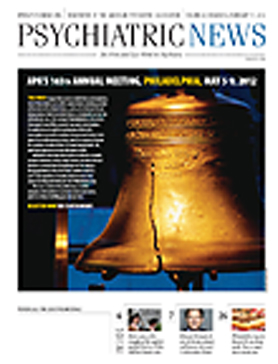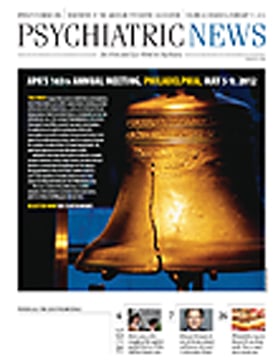Among the special tracks presented at the 2012 annual meeting is one organized by the National Institute on Alcohol Abuse and Alcoholism (NIAAA) that will include a forum, lectures, symposia, and workshops.
One highlight of the track will be the plenary lecture on Saturday afternoon, May 5, titled “Musings on Decades of Progress in Alcoholism Treatment Research” by Bankole Johnson, M.D., Ph.D. Johnson, the Alumni Professor and chair of the Department of Psychiatry and Neurobehavioral Sciences at the University of Virginia, will discuss how the recognition of subtypes of alcohol dependence, both psychosocial and molecular, has led to the growing rise of personalized medicine that offers the promise of even more powerful or targeted medicines. The concept of multiple drug and multimodal behavioral treatments, and at various stages of the disease, will be introduced.
On Tuesday, May 8, John Krystal, M.D., will present the Frontiers of Science Lecture titled “Glutamate, Dopamine, and Alcoholism: From Vulnerability to Treatment.” Krystal is a professor of translational research, chair of the Department of Psychiatry, and chief of psychiatry at Yale-New Haven Hospital. He serves on the NIAAA Advisory Council, the Department of Defense Psychological Health Advisory Committee, and the Institute of Medicine of the National Academy of Sciences, and he is president-elect of the American College of Neuropsychopharmacology. Krystal has been editor of the journal Biological Psychiatry since 2006.
During a Saturday forum, Vivian Faden, Ph.D., NIAAA’s associate director for behavioral research and director of the Office of Science Policy and Communications, will introduce Alcohol Screening and Brief Intervention for Youth: A Practitioner’s Guide, a new resource from NIAAA developed in collaboration with the American Academy of Pediatrics, a team of researchers and clinical specialists in underage drinking, and health care professionals. The presentation will teach participants how to use the guide, which is aimed at both primary care and mental health clinicians working with adolescents and youth.
Also scheduled on Saturday is the workshop “Helping Patients Who Drink Too Much: Using the NIAAA Clinician’s Guide,” chaired by Mark Willenbring, M.D., director of the NIAAA’s Treatment and Recovery Research Division. Workshop participants will develop skills in screening for alcohol problems using a single question, diagnosing and staging alcohol dependence, brief motivational counseling, and treatment of alcohol dependence with medication and brief behavioral support. Also covered in this workshop will be a new online resource devoted to the guide and related professional support materials, including downloadable forms, publications, and training resources.
The symposium “Integrating the Full Spectrum of Alcohol and Other Drug Problems in Psychiatric Primary Care” is also planned for Saturday, chaired by Robert Huebner, M.D., NIAAA’s acting director of the Division of Treatment and Recovery Research. The symposium will examine a number of clinical and organizational questions relevant to the integration of services for alcohol use disorders, other psychiatric disorders, and primary care.
Sunday’s events will include a morning symposium, “Medication Use for Treating Alcohol Dependence,” chaired by Raye Litten, Ph.D., chief of the Treatment Research Branch of the NIAAA’s Division of Clinical and Prevention Research. The symposium will explore novel molecular targets for pharmaco-therapeutic treatment of alcohol dependence.
A Sunday afternoon workshop titled “Management of Patients with Alcohol and Co-Occurring Disorders: Problems and Solutions” will be chaired by Deidra Roach, M.D., of the NIAAA’s Division of Treatment and Recovery Research. The workshop will include an overview of the current research on HIV-infected women with co-occurring alcohol misuse and other mental health disorders, with special emphasis on co-occurring anxiety and depression.
A Monday morning symposium, “Use of Technology for Research Treatment and Evaluation of Alcohol Dependence,” will be chaired by Daniel Falk, Ph.D., of the NIAAA’s Division of Treatment and Recovery Research. A highlight will be research presented by Patrick Bordnick, Ph.D., an associate professor at the University of Houston-Graduate College of Social Work, in which state-of-the-art computerized virtual reality was used to simulate drinking environments as an adjunct to cognitive-behavioral therapy in the treatment of alcohol dependence.
Also on Monday morning, the workshop “Update on Screening and Brief Intervention (SBI): What We Know and Don’t Know About SBI” will be chaired by Richard Saitz, M.D., a professor of medicine and epidemiology at Boston University School of Medicine.
The Monday afternoon symposium, “Double Trouble: Co-Occurrence of Alcoholism and Psychiatric Disorders,” will be chaired by Alan Green, M.D., a professor of psychiatry and of pharmacology and toxicology at Dartmouth Medical School. The symposium will highlight the high prevalence of alcohol/psychiatric comorbidity, present state-of-the-art research findings as it relates to treatment, and finish with a general discussion related to identification of knowledge gaps that are ready for future research.
On Tuesday morning, Markus Heilig, M.D., Ph.D., chief of NIAAA’s Laboratory of Clinical and Translational Studies, will chair the symposium “Personalized Medicine: An Update” that will discuss how research that focuses on matching patients to specific treatments during the next decade will be a high priority.
Also on Tuesday, the workshop “Extended Treatment for Alcohol Use Disorders: An Update” will be chaired by James McKay, Ph.D., director of the Center on the Continuum of Care in the Addictions at the University of Pennsylvania, director of the Center of Excellence in Substance Abuse Treatment and Education at the Philadelphia Veterans Affairs Medical Center, and scientific director of the Center for Studies of Addiction at the University of Pennsylvania. The workshop will provide a comprehensive review of the latest research on both standard approaches to continuing care and newer adaptive models.
A final workshop on Wednesday will be chaired by Ray Anton, M.D., director of the Center for Drug and Alcohol Programs and of the Clinical Neurobiology Laboratory at the Medical University of South Carolina. “Biomarkers and Alcohol Use Disorders: Applications in Clinical Practice” will explore strengths and weaknesses of each biomarker as well as strategies for using alcohol biomarkers in multiple applied settings.


